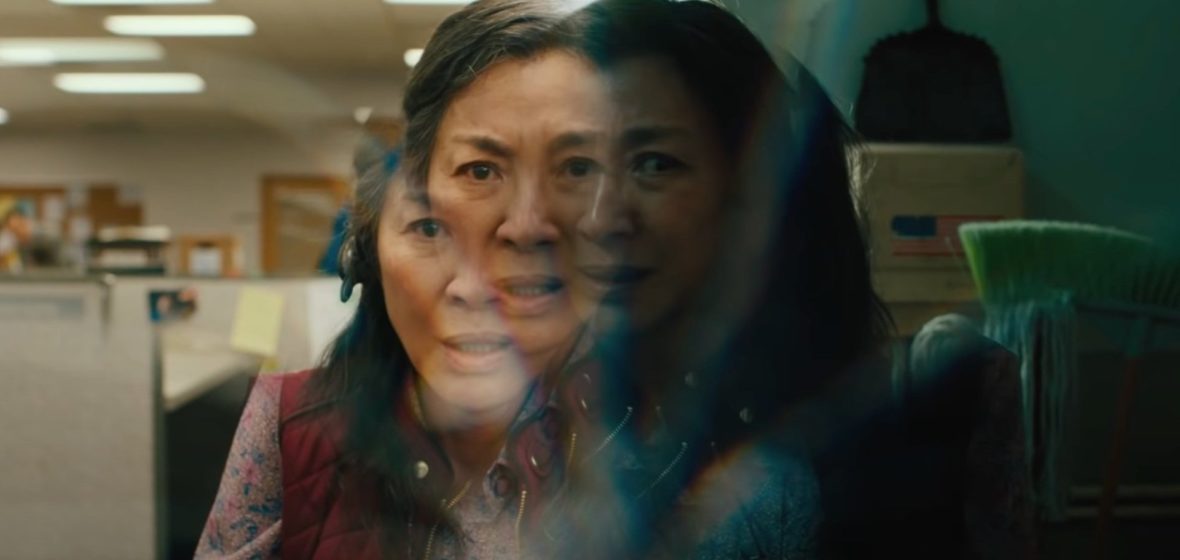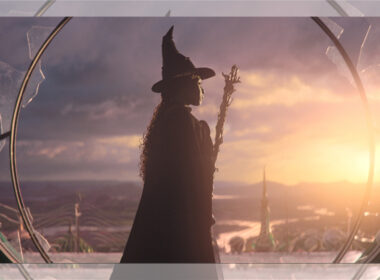Rating: *****
Something intensely personal in Everything Everywhere All At Once puzzled me even a week after I saw it. The film is an ecstatic romp of visual bravado spawning a million different ideas through a million other universes. It succeeds at saying a lot about everything, and yet, at its core, it’s easily relatable on a personal level. After the screening, everyone I talked to had been affected by a different element of the story, and I noticed a hidden universality at the film’s heart. Read other reviews after this one –for if there’s a number one reason to watch this film, it’s that it will probably affect you in a way only you can understand.
The brainchild of Daniel Kwan and Daniel Scheinert, commonly known as the Daniels, Everything Everywhere All At Once, invites its classification. It’s good like that; everyone is invited to experience it in their way. It starts with Evelyn Wang (Michelle Yeoh), who lives above a laundry mat she owns with her husband Waymond (Ke Huy Quan). The business isn’t thriving – mainly because of Evelyn’s weak financial acumen – her daughter Joy (Stephanie Hsu) wants to come out to her grandfather (James Hong), and, to top it all, the IRS clerk (Jamie Lee Curtis) gave her until the end of the day to balance the number or else they’ll close her business. It’s in the midst of all this chaos that Evelyn is visited by someone (to reveal it would be to spoil a great moment, and I couldn’t take that away from you) who explains to her that she’s just one of the many Evelyns spread across the infinite multiverse: and there is an evil being who is working to destroy all the universes, and only Evelyn can stop them.
Thus starts a deranged universe and genre-hopping adventure with the most unlikely hero. Because as Evelyn gets to experience and relieve the lives of her different selves, she realises the one we first meet happens to be the worst. In one version, she’s a successful actor with martial arts training. In another, she is a talented chef. All different Evelyns make the first one question every choice she has ever made, from running away with Waymond, the husband she resents for her current unhappiness, to her relationship with her father and daughter.
That’s where Everything Everywhere All At Once gets personal. As the multitude of lines converges into a mess of action and derangement, the Daniels take time to remind us of the humanity left in these people. I saw in Evelyn that angst comes from compromising your own family’s expectations against your nature. A flashback with Evelyn and her father hit close to the day I told my parents I was in a band and received a cold “well, this better not distract you from your studies”. From that cynical attitude comes the rift with Joy, the rebellious daughter who refuses to compromise.
That same rebellious spirit lives in the Daniels. In a bold act of defiance, they embrace all their artistic references to create a world where they can all live in harmony. This is a film that includes an outrageous action set piece with different characters are trying to insert objects in their anuses to unlock a new power – that goes hand in hand with callbacks to classic Jackie Chan films, Disney-Pixar, and a fantastic segment inspired by Wong Kar Wai that alone is justification for giving both Yeoh and Quan an Oscar. These elements converge in a final action scene where Evelyn has to fight all these references.
Given a chance, this would be a five-thousand word manifesto about how everything connected to my lived experience. But everything I say risks taking from you the joy of seeing it for the first time. Near the end, the film has a minor revelation in a moment of peace so inventive and extraordinary it made me cry a little – you’ll know what I mean.
It’s the cast that bears the heart and soul of it all. The Daniels gave the platform, but what Yeoh, Quan and Hsu do with it is extraordinary. For those in the know, Yeoh was always that secret we wanted to share with the rest of the world, so it’s very emotional to see her showcasing her impressive range for two hours. Quan, though, was unexpected. You may remember him as Short Round from Indiana Jones and Temple of Doom, a child actor from the 80s who unfortunately had disappeared from pop culture. Here he returns so triumphantly it made me sad we haven’t seen more of him in mainstream movies. His Waymond is the perfect balance to the opposing forces of Evelyn / Joy. His positive take seems almost unchangeable between universes, with only how he expresses himself to Evelyn making the difference. At the start, there’s this heartbreaking moment where he sees an old Asian couple still lovingly helping each other, and he realises that’s the life he wishes for himself and Evelyn. Not even 15 minutes later, he does a perfect Jackie Chan-like routine that I thought would be the height of his range, until later on, he brings us the most perfect Tony Leung we’ve seen in a long time.
I can’t say more. See this film. Please see it today. Even if you don’t like it, you won’t be indifferent to it; it’s impossible. In the past week one of the Daniels, Kwan reacted to the comments from the American-Korean director Kongonada. Both filmmakers have opposite styles (Kwan is a maximalist, Kongonada a minimalist), yet the latter saw himself in the cacophony of the former’s film. From this, Kwan humbly talked about how he had been continuously held back by shame that his style wasn’t “serious art”, but part of his change to accept was when he managed to separate “subtlety” from “nuance” and from there this film was created. A film that has not one shred of subtlety but is flooded by nuances about our humanity, how we consume art, the experience of immigration, intergenerational trauma, about acceptance and departure, about our connection to art, about how our personality is shaped by other preconceived ideas of what is good and what is not. About everything. Every person, every world, every film, every rock, every piece of plastic, every family. Everything. And if you miss it, it’s on you.




